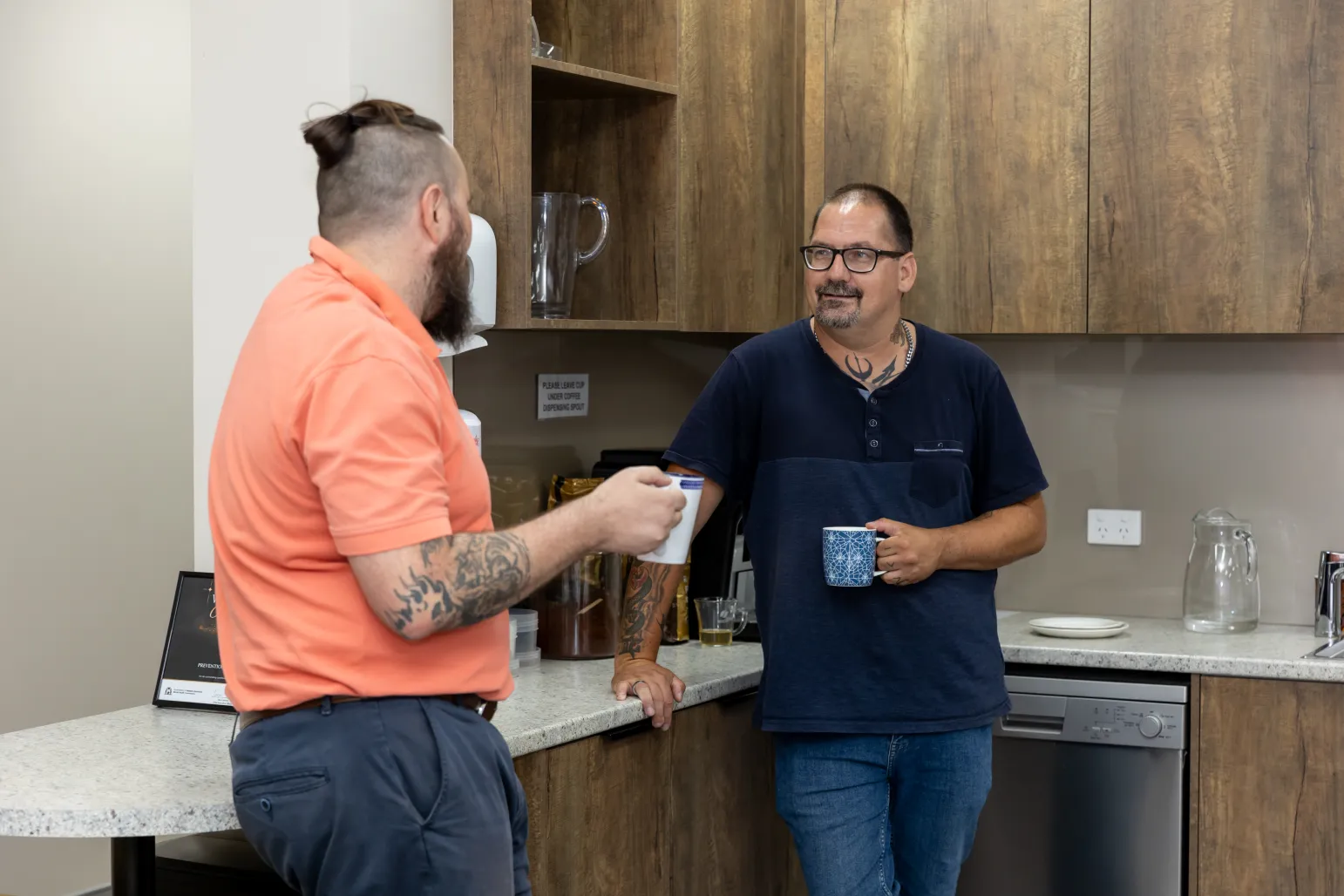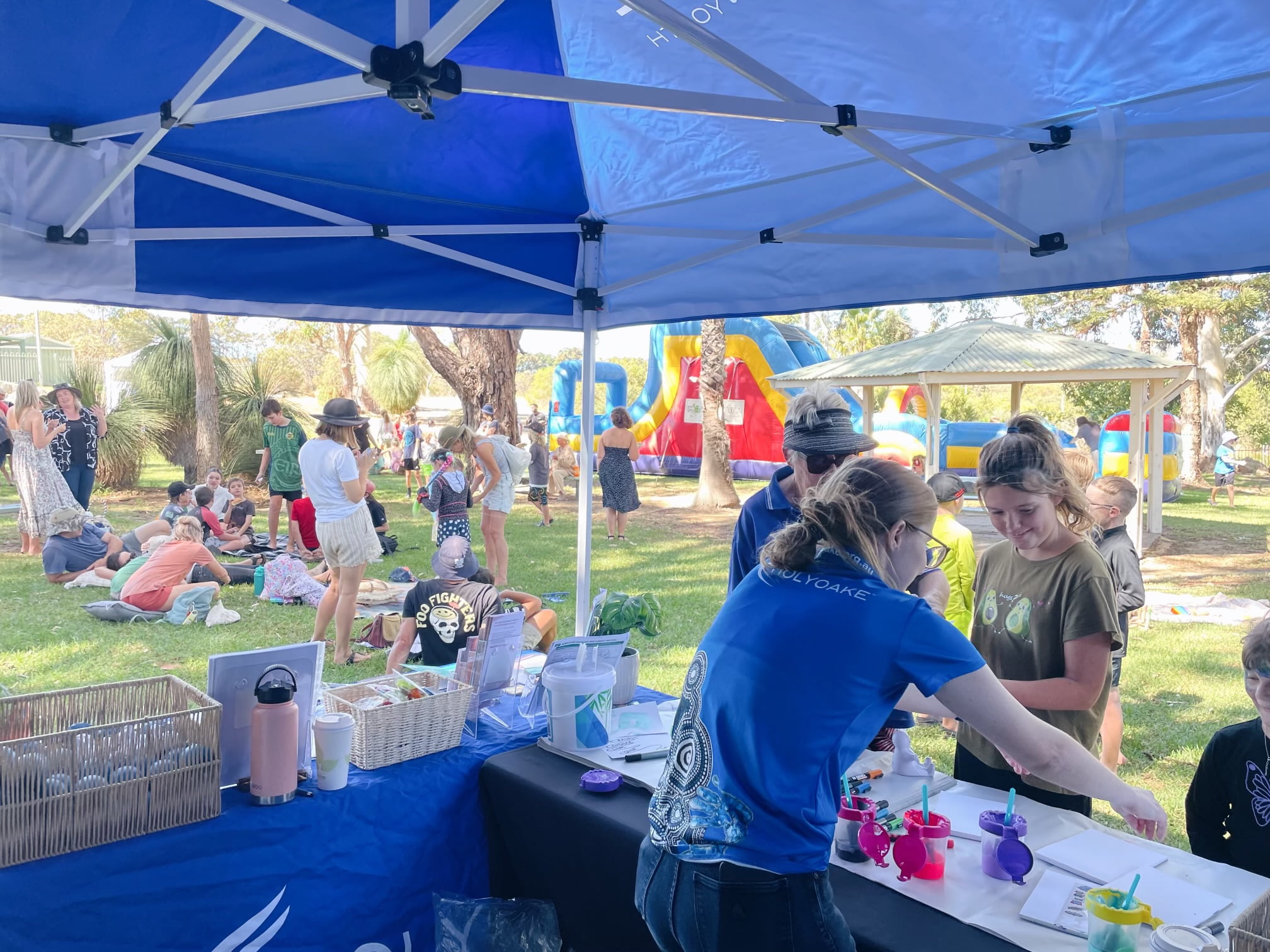Community Capacity Building, Training and Education
For: Prevention
Available in: Wheatbelt
Community capacity building helps to promote the understanding of alcohol and drug use, mental health challenges and suicide awareness through preventive training and education initiatives.
Our capacity-building initiatives are available to communities across Western Australia’s Wheatbelt region.
Thank you so much for taking the time and effort to present at our conference. The feedback from staff was very positive.
Department of Communities
Community capacity building is about helping communities recognise their challenges, come up with practical solutions, and encourage positive behaviour change. It creates a lasting impact by empowering people to take action both individually and together, for long-term, meaningful change.
Here at Holyoake, we work with communities throughout the Wheatbelt to spread information about AOD support, mental health challenges and suicide awareness. If you or someone you know needs support, be sure to contact our team today.
The Wheatbelt Alcohol and Other Drug Prevention Coordinator (AOD PC) delivers a range of community capacity-building training programs designed to strengthen local knowledge and response to alcohol and other drug issues. These programs include:
This targeted capacity-building program provides information about clinical interventions for volatile substance use, including school presentations conducted in collaboration with the Department of Education’s Road Safety and Drug Education Branch (RSDE) representatives.
Please note: RSDE provides training for school staff, whereas Holyoake provides support after volatile substance use has been reported.
This training covers the impact of alcohol consumption during one’s childbearing years. This course is recommended for those working with women and men in their childbearing years (including people from government and non-government agencies). It’s a great program for counsellors, health promotion officers, peer support workers, midwives and child health nurses.
This ‘FASD Prevention in Communities’ training is facilitated by the Mental Health Commission.
This course encourages community participation to support healthy behaviours and prevent alcohol consumption during pregnancy. Consuming alcohol can negatively affect the development of a fetus during pregnancy. The course is especially recommended for young people and those planning to have children.
This training includes evidence-based AOD presentations and is customised to meet the needs of sporting clubs. Our presentations educate club membership and the broader community about AOD harms and effective harm-reduction strategies.
The Wheatbelt AOD Prevention Coordinator has undergone training through the Australian Drug Foundation to deliver training in local sporting clubs.
We can develop and deliver custom training to suit specific organisational needs, presented by the Wheatbelt AOD Prevention Coordinator (with Mental Health Literacy facilitated by our Suicide Prevention Coordinator).
Alcohol and other drug literacy
AOD harm reduction and implementing it in your organisation/community
Responding to a methamphetamine or opioid overdose.
Please contact us if you have any training requests, and we can work together to create a presentation to address your needs. Email: wcadsprevention@holyoake.org.au
The Mental Health Commission offers free online alcohol and other drug training.
For more information and to register, visit the MHC website: Online learning (mhc.wa.gov.au)
Designed for professionals and paraprofessionals, this training provides participants with a wide range of skills and knowledge to improve their ability and confidence to work with suicidal people and make referrals to professional help.
Designed for professionals, paraprofessionals, frontline workers, volunteers and the community, this course is for people who want to safely and effectively support friends, family, colleagues and strangers in distress or experiencing a crisis.
The active listening, calming and effective gentle questioning skills learnt on this course can be applied in many contexts and include learning how to ask about suicide risk and respond safely, whatever the answer.
Designed for frontline workers, volunteers and the community, this workshop helps participants improve their awareness and understanding of mental health issues and make the connection between mental health and personal safety.
The workshop promotes confidence, strategies, and pathways to support people in preserving their mental health and the mental health of their family and friends.
Designed for frontline workers, volunteers and the community, safeTALK is a half-day training course in suicide alertness. It helps participants recognise a person with thoughts of suicide and connect them with resources that can help them choose to live.
The training focuses on using the TALK steps – Tell, Ask, Listen, KeepSafe – to engage with people with thoughts of suicide and help them connect with life-affirming resources.
Trauma Informed Care and Practice (TICP) is an approach that recognises and acknowledges trauma and its prevalence, alongside awareness and sensitivity to its dynamics, in all aspects of service delivery.
Types of trauma
Recognising the signs of trauma
The impact of trauma
Creating safe and supportive environments
Equipping adults with the knowledge, skills, and confidence to recognise, understand and respond to a friend, family member, co-worker or another adult experiencing a mental health problem or mental health crisis.
Training adults who teach, care for or support young people with the knowledge, skills, and confidence to recognise, understand and respond to a young person experiencing a mental health problem or mental health crisis.
Providing adults with the knowledge, skills, and confidence to recognise, understand and respond to an Aboriginal or Torres Strait Islander adult experiencing a mental health problem or mental health crisis.
Community capacity building is a long-term process. If you have any training or education inquiries, contact our team. Let’s work together to improve our community.
Email: wcadsprevention@holyoake.org.au
Need help? We offer a large range of support services that can be delivered both in person and online. Give us a call or email us at clientservices@holyoake.org.au today.

Male peer-group support programs that help individuals address alcohol or drug use and its impact…
Read more about
Coordination and support of stakeholders, organisations and community groups in the development, implementation, and evaluation…
Read more about
One-on-one counselling in a safe, caring and non-judgemental environment for young people impacted by alcohol,…
Read more about